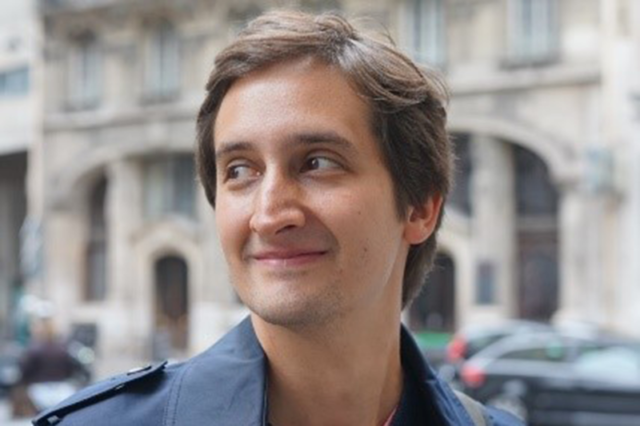Name: Antoine Goujon
Current position: Assistant Professor
Place: MOLTECH-Anjou laboratory, Université d’Angers, France
Research topic: Organic Materials, Supramolecular Chemistry and Organic Electronics
What was your position and research topic within the NCCR Chemical Biology?
I was working as a postdoctoral researcher in the group of Prof. Stefan Matile. My work was focused on the design, synthesis and evaluation of fluorescent mechanosensitive probes able to sense and visualize membrane tension in model vesicles and living cells by fluorescence lifetime imaging (FLIM). This is a very demanding project on the synthetic side, as the molecules should fit a tricky list of requirements to perform as efficient fluorescent tension reporters. Replacing a single atom can induce dramatic changes in their photophysical and biological performances! Among the different topics I tackled on during this period, the most noticeable results were the synthesis and use of fluorescent tension reporter able to reach the membrane of intracellular compartments and report on the relative membrane tension of organelles such as mitochondria, lysosomes and endoplasmic reticulum. These new tools are now used to see forces that were so far invisible to state-of-the art imaging and biophysical techniques!
Could you describe your career path after leaving the NCCR Chemical Biology?
Toward the end of my postdoc mid-2019, I have been appointed Maître de Conférence (the French equivalent to Assistant Professor) at the University of Angers in France, where I joined the MOLTECH-Anjou laboratory directed by Prof. Marc Sallé.
What was the best or more exciting moment of your career until now?
During my PhD with Prof. Giuseppone at the Université de Strasbourg, we were using nanoscopic molecular machines to amplify their motions in macroscopic materials. We prepared very complex molecules able to perform controlled translating or rotating motions when exposed to a chemical stimuli or light and implemented them in polymeric materials or supramolecular assemblies. Seeing, with the naked eye, gels and films being put in motion by the amplified collective actuations of thousands of molecules shuffling or spinning together has been a real “wow!” moment. I am very proud to say that I have been part of this adventure.
What did you find unique about your collaboration with the NCCR Chemical Biology?
The NCCR Chemical Biology puts a clear emphasis on collaboration with other researchers within the network. It is very exciting and challenging to be surrounded by bright, ambitious and motivated scientists. Elaborating experiments, solving problems and discussing results with specialists of various fields from different groups and universities has been very stimulating. There was a real incentive to always look for new collaborations and seek for the improvements other researchers can bring to your work, and vice-versa. I feel that a multi-disciplinary project such as the one we were working on, turned into success because of the conjoint efforts of several teams perfectly catalysed by the NCCR Chemical Biology.
What are the skills/expertise acquired with the NCCR Chemical Biology that are useful to you today?
As I was coming from material and synthetic chemistry, diving in a more biologically oriented environment has been a great experience even though it was a bit stressful and scary at the beginning to be honest! What does all these abbreviations mean? Progressively, as I was learning from my supervisor, co-workers and collaborators, I was feeling more and more comfortable with the topic. I found myself cultivating cells and performing confocal laser scanning microscopy, which ended up being pretty fun and different from my past research experiences. The collaborations with experts in biophysics and biology often made me look at our problems with a very different point of view. Interdisciplinary projects force you to try to look at your work from the other experts side, and teach you how to communicate and explain your work to very different audiences.
What is your current research topic?
Since I joined the MOLTECH-Anjou laboratory as an Assistant Professor, I have been again venturing into a new topic. I work on the synthesis of optically and electronically active organic molecules, the study of their properties and self-assembly into supramolecular architectures. In these first few months, my work has been focused on the discovery of new functionalization and synthetic methodologies for the preparation of a well-known class of organic semiconductors. These strategies will be extended to more complex and original polyaromatic molecules in the future. Such molecules would find applications in organic field-effect transistors (OFET), organic solar cells (OSC) or organic light emitting devices (OLED), among others. These technologies belong to organic electronics, sometimes called “plastic electronics”, which aim at replacing metallic semiconductors by organic analogues. The properties of organic molecules such as their colour and electric conductivity can be finely tuned by rational molecular design. Organic molecules based electronic devices have interesting advantages such as their low-energy consumption, low cost, and allow for the preparation of bendable and foldable displays you might have seen appearing recently on new smartphones.
Do you have any advice to give to younger researchers interested in your career path?
Since I have been working as a researcher, the advice I have been given were: work hard, publish great papers, be curious, harden up, take risks, travel to respected labs and don’t be afraid to venture into new topics. To get a job in academia, the competition is tough, the available positions scarce, and even when you get there, things will not be easy. For these reasons, the aforementioned advice is on point. However, if I look back, I think it is important to also remember to be kind with your co-workers/ lab mates and collaborators, try to maintain a good atmosphere in the lab, try to remain positive when the science looks grim, and reach for help when you need it, which is not a sign of weakness but one of humility. Help younger lab members as senior researchers helped you. I feel like I would not be where I am today, doing the job I really wanted to do, if I had not been supported by amazing people, learned a lot from them, both at a social and scientific level.
 Dr. Antoine Goujon obtained his Master in Molecular and Supramolecular Chemistry in 2012 from the University of Strasbourg (France). During these studies, he worked in the group of Prof. Jonathan Nitschke at the University of Cambridge (UK) on self-assembled organometallic molecular capsules and Dr. Jean Weiss at the University of Strasbourg on bioinspired haemoprotein mimics. He obtained his PhD in 2016 from the group of Prof. Nicolas Giuseppone, working on the macroscopic amplification of collective motions of nanoscopic molecular machines. From 2017 to mid-2019, he worked as a postdoctoral researcher in the group of Prof. Stefan Matile at the University of Geneva (Switzerland) on the design of fluorescent tension reporters for cellular membranes. Since September 2019, he has been appointed as Maître de Conférences (Assistant Professor) in the MOLTECH-Anjou laboratory at the University of Angers (France).
Dr. Antoine Goujon obtained his Master in Molecular and Supramolecular Chemistry in 2012 from the University of Strasbourg (France). During these studies, he worked in the group of Prof. Jonathan Nitschke at the University of Cambridge (UK) on self-assembled organometallic molecular capsules and Dr. Jean Weiss at the University of Strasbourg on bioinspired haemoprotein mimics. He obtained his PhD in 2016 from the group of Prof. Nicolas Giuseppone, working on the macroscopic amplification of collective motions of nanoscopic molecular machines. From 2017 to mid-2019, he worked as a postdoctoral researcher in the group of Prof. Stefan Matile at the University of Geneva (Switzerland) on the design of fluorescent tension reporters for cellular membranes. Since September 2019, he has been appointed as Maître de Conférences (Assistant Professor) in the MOLTECH-Anjou laboratory at the University of Angers (France).


Leave a comment
The editors reserve the right not to publish comments or to abridge them.